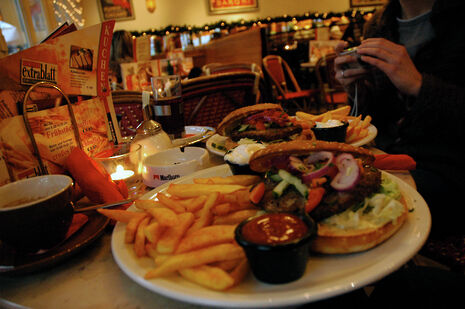Seasonality and internationality: German cuisine takes on Leitkultur
Columnist Juliet Morland reflects upon how changes to the plate reflect and broaden culture

Cambridge students might head to Grudgebridge to pour their hearts out over the temporary withdrawal of hummus from Sainsbury’s, but in Fulda, hummus never reaches the supermarket shelves. Home cooking here is certainly a lot more traditional than it is in the UK. While people eat a variety of cuisines out, at home, European cooking is the norm. Ingredients for Austrian schnitzel, Italian pasta recipes and east-European beetroot soup are readily available in my local supermarket, but most things from beyond the EU are either out of reach or restricted to ethnic shops.
Recently, Germany’s Federal Minister of the Interior, Thomas de Maizière, released ten bullet points promoting a guideline of German Leitkultur, meaning leading or dominant culture, including a rejection of the burqa and an insistence that Germans greet each other by shaking hands. Backlash rejecting the minister’s vision has been huge, with one Twitter user questioning whether he and his family are at risk of deportation, because no one shook his hand at breakfast. Even conservatives are suggesting that such a thesis may be unconstitutional. But in terms of food, the battle for a German Leitkultur is already in the process of being defeated.
“German cuisine isn’t defeating Leitkultur in battle, because culture is rarely ideological. Rather, ideology develops organically as part of everyday life.”
The idea of Leitkultur in a multicultural society is simply out of date. What we eat doesn’t, on the surface of it, seem like a choice of national significance, but it does highlight a nation’s attitude towards multiculturalism, and it is also an indicator of globalisation. In a society where national cuisine is already overshadowed by dishes from elsewhere in Europe, and culinary ideas from even further-afield are becoming more and more common in kitchens, the concept of a leading, German culture is being subconsciously rejected and replaced by global culture. German cuisine isn’t defeating Leitkultur in battle, because culture is rarely ideological. Rather, ideology develops organically as part of everyday life. While Fulda may be moving a little more slowly than larger, more globalised cities like Berlin, already, Italian dishes rival traditional, German cuisine and dietary preferences are rapidly changing.
One of the biggest changes to dietary habits is the rise of veganism and vegetarianism, neither of which have roots in any European cultures, let alone German culture. While no two statistics seem to agree on the precise percentage of vegetarians in Germany, it is mostly agreed that the percentage of non-meat eaters is higher than in the UK. This correlates with my personal experience, as I constantly feel surrounded by fellow herbivores. But while in Cambridge, my diet is limited by the fruit and vegetable selection in Sainsbury’s and my limited cooking expertise, here my options are even more restricted. In the UK, we overcome seasonality by importing food from across the globe, but in Germany, all the vegetables in my fridge come from Europe, with a significant percentage from Hessen, my local region.
Instead, each month shoppers are overwhelmed by a new in-season vegetable dominating the supermarket shelves. This month it’s asparagus. In fact, Spargel, asparagus, was my first German word. I was about ten, and my dad, returning from a trip to Germany in May, had brought home a strange, white plant. I eyed the new plate-invader with deep suspicion. It tasted bitter and looked suspiciously healthy. In Britain, asparagus is plentiful all year round. It is green, long, and a bit strange-looking. In Germany, asparagus may look a little odd, but that is where the similarities end. It is white, stumpy and only readily available in May. Furthermore, there are strong traditions around the way it is prepared and cooked. Asparagus is a delicacy that, I have been told, must be meticulously prepared: peeled, flavoured and gently roasted. Only then may it be enjoyed alongside a traditional schnitzel with hollandaise sauce.
Recently I observed a lesson on ethnic food in the vocational school where I work and was told that the hummus we expect to find in Sainsbury’s every day is “exotic”. But what is still deemed exotic in the home is now commonplace when eating in local restaurants and cafes. Sausages are out and Döner is in. Goodbye pretzel, hello sushi. If these foods are ready available in restaurants, their ingredients will soon be readily available in local supermarkets across the country, as Germans will learn to prepare them at home. Culture in Germany cannot and will not be prescribed by a politician, but by Germans themselves
 Features / Should I stay or should I go? Cambridge students and alumni reflect on how their memories stay with them15 December 2025
Features / Should I stay or should I go? Cambridge students and alumni reflect on how their memories stay with them15 December 2025 News / Dons warn PM about Vet School closure16 December 2025
News / Dons warn PM about Vet School closure16 December 2025 News / Cambridge study finds students learn better with notes than AI13 December 2025
News / Cambridge study finds students learn better with notes than AI13 December 2025 News / News In Brief: Michaelmas marriages, monogamous mammals, and messaging manipulation15 December 2025
News / News In Brief: Michaelmas marriages, monogamous mammals, and messaging manipulation15 December 2025 Comment / The magic of an eight-week term15 December 2025
Comment / The magic of an eight-week term15 December 2025










